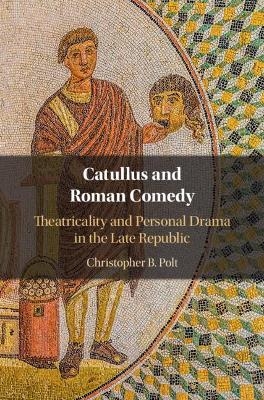
Catullus and Roman Comedy
Theatricality and Personal Drama in the Late Republic
Seiten
2021
Cambridge University Press (Verlag)
978-1-108-83981-5 (ISBN)
Cambridge University Press (Verlag)
978-1-108-83981-5 (ISBN)
Argues that the largest extant theatrical tradition of the third and second centuries BCE continued to be vital for writers of the first century BCE, especially in helping them to communicate strange and difficult ideas about their personal anxieties and concerns to public audience.
In the past century, scholars have observed a veritable full cast of characters from Roman comedy in the poetry of Catullus. Despite this growing recognition of comedy's allusive presence in Catullus' work, there has never been an extended analysis of how he engaged with this foundational Roman genre. This book sketches a more coherent picture of Catullus' use of Roman comedy and shows that individual points of contact with the theatre in his corpus are part of a larger, more sustained poetic program than has been recognized. Roman comedy, it argues, offered Catullus a common cultural vocabulary, drawn from the public stage and shared with his audience, with which to explore and convey private ideas about love, friendship, and social rivalry. It also demonstrates that Roman comedy continued to present writers after the second century BCE with a meaningful source of social, cultural, and artistic value.
In the past century, scholars have observed a veritable full cast of characters from Roman comedy in the poetry of Catullus. Despite this growing recognition of comedy's allusive presence in Catullus' work, there has never been an extended analysis of how he engaged with this foundational Roman genre. This book sketches a more coherent picture of Catullus' use of Roman comedy and shows that individual points of contact with the theatre in his corpus are part of a larger, more sustained poetic program than has been recognized. Roman comedy, it argues, offered Catullus a common cultural vocabulary, drawn from the public stage and shared with his audience, with which to explore and convey private ideas about love, friendship, and social rivalry. It also demonstrates that Roman comedy continued to present writers after the second century BCE with a meaningful source of social, cultural, and artistic value.
Christopher B. Polt is an Assistant Professor of Classical Studies at Boston College, Massachusetts. He has published extensively on Latin poetry of the Republic and early Empire. He was the recipient of the Linda Dykstra Distinguished Dissertation Award in the Humanities and Fine Arts at the University of North Carolina, Chapel Hill.
Introduction; 1. Through the Comic Looking-Glass; 2. The Best Medicine: Comic Cures for Love in the 1st Century BCE; 3. Heroic Badness and Catullus' Plautine Plots; 4. Naughty Girls: Comic Figures and Gendered Control in Catullus; Epilogue. The Show Goes On: From Roman Comedy to Latin Love Elegy; Bibliography.
| Erscheinungsdatum | 15.01.2021 |
|---|---|
| Zusatzinfo | Worked examples or Exercises |
| Verlagsort | Cambridge |
| Sprache | englisch |
| Maße | 157 x 235 mm |
| Gewicht | 470 g |
| Themenwelt | Literatur ► Lyrik / Dramatik ► Lyrik / Gedichte |
| Literatur ► Romane / Erzählungen | |
| Kunst / Musik / Theater ► Theater / Ballett | |
| Geisteswissenschaften ► Sprach- / Literaturwissenschaft ► Anglistik / Amerikanistik | |
| Geisteswissenschaften ► Sprach- / Literaturwissenschaft ► Literaturwissenschaft | |
| ISBN-10 | 1-108-83981-9 / 1108839819 |
| ISBN-13 | 978-1-108-83981-5 / 9781108839815 |
| Zustand | Neuware |
| Informationen gemäß Produktsicherheitsverordnung (GPSR) | |
| Haben Sie eine Frage zum Produkt? |
Mehr entdecken
aus dem Bereich
aus dem Bereich
Deutsche Gedichte aus zwölf Jahrhunderten
Buch | Hardcover (2023)
C.H.Beck (Verlag)
28,00 €
Text, Übersetzung, Melodien, Kommentar
Buch | Softcover (2024)
De Gruyter (Verlag)
24,95 €


